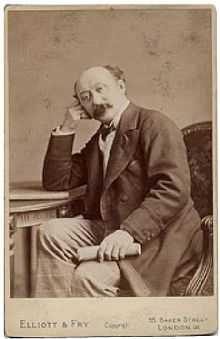Luigi Arditi

 |
|
| Problems playing this file? See media help. | |
Luigi Arditi (16 July 1822 – 1 May 1903) was an Italian violinist, composer and conductor.
Arditi was born in Crescentino, Piemonte (Italy). He began his musical career as a violinist, and studied music at the Conservatory of Milan. He made his debut in 1843 as a director at Vercelli, and it was there that he was made an honorary member of the Philharmonic Academy. Arditi conducted opera throughout Italy and in 1846 found himself conducting as far afield as Havana, Cuba. This was where he first met Bottesini). He visited America, where he remained for a while, conducting operas in New York, Philadelphia and other cities until 1856. Then, following a visit to Constantinople, he decided to settle in London, but made several trips again to America with the Royal Italian Opera Company. He also conducted in Germany, and in other major European cities such as St. Petersburg, Vienna and Madrid. After 1885, he was in England, conducting at Covent Garden and in various prestigious theatres and promenade concerts in London's parks. He died at Hove, near Brighton (England), and is buried in Hove Cemetery. Arditi's best-known operas are: I Briganti, II Corsaro, and La Spia, ("The Spy"). In addition he wrote numerous songs and vocal waltzes, the most popular of which are "Il Bacio" ("The Kiss", dedicated to Gottardo Aldighieri), "Le TortorelIe", "Se Seran Rose", and the "Parla Waltz".
His Inno Turco (1856) for Sultan Abdülmecid I set to a Turkish text was later sung in London during the state visit of Sultan Abdülaziz at Crystal Palace by a British choir of 1600 in July 1867. The world premiere recording of Inno Turco, by Turkish music historian Dr Emre Araci with the Prague Symphony Orchestra and Philharmonic Choir, was released in 2005 by the Brilliant Classics label.
References
 This article incorporates text from a publication now in the public domain: Chisholm, Hugh, ed. (1911). Encyclopædia Britannica (11th ed.). Cambridge University Press
This article incorporates text from a publication now in the public domain: Chisholm, Hugh, ed. (1911). Encyclopædia Britannica (11th ed.). Cambridge University Press
External links
- Free scores by Luigi Arditi at the International Music Score Library Project
- Index at arditi.homestead.com
- World premiere recording of Inno Turco (1856) is featured on Emre Araci's Euro-Ottomania album released by Brilliant Classics
|